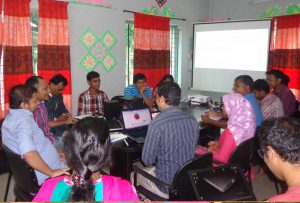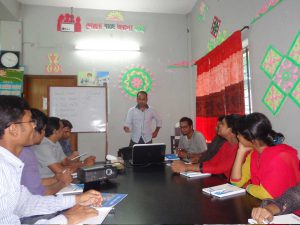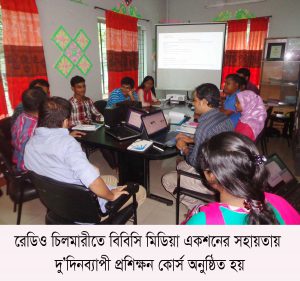Basic information
While there is an increasing demand from audiences for the opportunity to question leaders on local issues related to public services, citizens do not have any platform to come face to face, to collaborate and to actively participate in the decision-making process. This has made the rationale to involve community radio stations as the only media platform to play an effective role in governance process at local level. As Bangladesh NGOs Network for Radio and Communication (BNNRC) is the only apex organization to coordinate and support all the radio stations, the work has aimed to engage directly with BNNRC and to analyse and strengthen the knowledge and skills within the network to allow member stations to be assisted in working on local governance issues. BBC Media Action and BNNRC signed a Memorandum of Understanding (MOU) during the month of August 2015 to work jointly with two community radio stations to produce pilots of interactive, audience-led governance programme.This MOU has been accomplished to trial techniques that build on the experience of the existing national Sanglap programme which BBC Media Action has been producing through a national-level television debate programme since 2005.
At the beginning of the project, BBC Media Action selected two community radio stations in consultation with BNNRC senior level staffs.Considering the geographical spread one station i.e. Radio Chilmari has been selected from the northern region. The other station-Radio Sagargiri was selected from the southern region of the country. Two interactive discussions with two selected stations helped the BBC Team to assess the level of skills and to identify the gaps of the producers which eventually helped them to make appropriate plan for future capacity building interventions for them. Responding to various queries from the facilitators, the participants discussed comprehensively about their present understanding on development and skill regarding program production, selection of program formats, scripting, outdoor recording, editing, presentation and feedback management received from the listeners after broadcasting. Basing on their feedbacks training on program development skill and editorial guideline has been organized in two stations in 02 phases.
The 1st Phase concentrated mostly on theoretical aspects of Program Production and included the sessions on : programs related to governance, problems in program production, political influence in producing governance-based programs, different types of program formats, quality in program production – the guideline,scripting,presentation skill, involving artist/presenter/listeners community in program production, recording, editing, use of sound-importance, planning and techniques of sound mixing, editorial ethics-authenticity of source, community radio code of conduct. The expert trainers of BBC Media Action discussed elaborately on the importance and techniques of audience-engagement in a program. While the 1st Phase of capacity building was conducted on the theoretical part of Radio Program Production skill and in an indoor manner, the 2nd phase concentrated on the practical aspect and in an outdoor setting. In the 2nd phase Radio Chilmari produced 02 programs on performance of local governance in Union Parishad titled as Jago Bahe [Brother, please wake up] and “Janatar Mukhomukhi”in Radio Sagorgiri.The programs were prepared in talk-show format.
To produce the program in a disciplined manner the facilitators divided the participants into groups and distributed them within the roles for program production, technical assistance, recording/microphone operation, and sound recording/editing. The distributed works included: contact with audience, prepare a form for the audience, develop a poster mentioning guideline to follow on the spot, prepare a list of required equipment during program production. Preliminary research is an essential step in the pre-production stage to identify the issue, location and relevant community people.
In the talk show, the local elected representatives presented face-to-face to the community people and responded to their queries. For example, during recording of the talk show –Jago Baho at Chilmari, the community people directly asked to the Chairman about the quality and progress in embankment works in their area. The people, on behalf of 250 river-eroded families asked for a permanent solution (rehabilitation) for river-erosion. The panel discussant Principal Mohammad Azizur Rahman accused chairman for his negligence on repairing of the roads and culverts of the union. Other panelist Farida Yasmin gave importance on appropriate planning for solving problems of roads, embankment, housing and related issues.
Jago Bahe (04 episodes) goes on-air 1st Sunday of every month at 4-10 P.M. Janatar Mukhomukhi is also broadcasting 04 episodes regularly.
One elected representative, M.Tajul Islam,Chairman, Sitakunda Union Parishad from Radio Sagargiri audience area told: “Our community is informed now about the services of Union Parishads and also of their rights.The program has also identified the problems which helped me to take appropriate steps for the solution.”
One local journalist in the area told: “broadcasting of such a program made our chairmen more active, responsive and accountable to the people. They are now taking effective steps in local development. Local journalists can also help in the process of establishing good governance at local level through reporting and supplying authentic information.”
Finally BNNRC.in cooperation with BBC Media Action Team, has developed a guideline on producing people-led content which would be used by the community radio broadcasters in the country.
Examples of linkages between the WSIS Action Line and the SDGs:
 The project: Building Capacity to produce interactive, audience-led governance program through community radio – links WSIS Action Line C4. Action line C4 focuses on development and promotion of programmes to eradicate illiteracy using ICTs at national, regional and international levels, with the aim of increasing the number of people with relevant ICT skills and to facilitate employment and entrepreneurship in the ICT sector. Through the project BNNRC targets to develop the skills of the young radio broadcasters who are going to take up the future leadership in community media sector.
The project: Building Capacity to produce interactive, audience-led governance program through community radio – links WSIS Action Line C4. Action line C4 focuses on development and promotion of programmes to eradicate illiteracy using ICTs at national, regional and international levels, with the aim of increasing the number of people with relevant ICT skills and to facilitate employment and entrepreneurship in the ICT sector. Through the project BNNRC targets to develop the skills of the young radio broadcasters who are going to take up the future leadership in community media sector.
The project directly links with SDG-4.4 and 4.7.The goals are as follows:
SDG -4.4: by 2030, substantially increase the number of youth and adults who have relevant skills, including technical and vocational skills, for employment, decent jobs and entrepreneurship
SDG- 4.7: By 2030, ensure that all learners acquire the knowledge and skills needed to promote sustainable development, including, among others, through education for sustainable development and sustainable lifestyles, human rights, gender equality, promotion of a culture of peace and nonviolence, global citizenship and appreciation of cultural diversity and of culture’s contribution to sustainable development
The above targets comply with the objectives of this project which aim to increase the number of technically skilled professional youth broadcasters who will acquire the knowledge and skills needed to promote sustainable development, including, among others, through education for sustainable development and sustainable lifestyles, human rights, gender equality, promotion of a culture of peace and of culture’s contribution to sustainable development.
WSIS Action Lines related to this project
 The project directly contributes and relates to C4: Capacity building and C9: Media.
The project directly contributes and relates to C4: Capacity building and C9: Media.
C4: Capacity building:
Focus of the action line C4 includes equipping people with the right skills and competencies and to meet up the growing need for the knowledge in the use of ICT’s, capacity building interventions focusing on the development and promotion of programmes more professionally through media.
Empowering communities in ICT use and promoting the production of useful and socially meaningful content is a capacity building intervention that can increase scientific knowledge and promote innovation and research.
C9: Media
Expanded media landscape built on ICTs and Internet is central to inclusive politics and governance and support realization and improvement of all human rights.
Highlights of the project’s partnership activities
 BNNRC was the main implementing partner while BBC Media Action has provided technical and financial assistance in implementation of the project.
BNNRC was the main implementing partner while BBC Media Action has provided technical and financial assistance in implementation of the project.
The project has been implemented in 02 community radio stations.BNNRC has made a partnership cooperation agreement with those stations. Through supervision and close cooperation of BNNRC, BBC Media Action team has conducted capacity assessment of those stations and provided technical training to the staffs of the selected stations. They were involved in making/recording the program at outdoor locations to help the Producers get the skill through practicing sessions at field level.BBC also provided guidance in developing “Producers’ Guideline on People’s – led Radio Content” in Bangla and English version.
During recording of the programs (Episodes on local governance) titled as Jago Bahe (Radio Chilmari) and Janatar Mukhomukhi (Radio Sagargiri) the local elected representatives, government officials and other dignitaries around the radio station area were invited. The local elected representatives, who were also invited in the program, met face-to-face with the local community people and responded to their queries. The government officials and other dignitaries were also included in the panel.
A strong partnership within the parties has made possible all the activities effective.
Challenges and future perspectives for the project
The skill acquired by the training and producing programs with practical experience at two community radio stations can be replicated in other stations. For that purpose, “Producing People’s-led governance –A Guideline” can be helpful as a common effective tool for all.BNNRC may coordinate in this process to engage, orient and supervise the rest of the community radio stations of the country. However, the process may need some more funding support.
Both the community and the local elected representatives will require some more awareness regarding right and access to information. They can be motivated more.
Views on WSIS Stocktaking and Prizes contest
WSIS Stocktaking and Prize will be an inspiring model to the community media practitioners in different parts of the world. The winning of the prize will be inspiring to our future broadcasters and policy-makers.
—————-
About: BNNRC
Bangladesh NGOs Network for Radio and Communication represents the community media sector to Government, Industry, Regulatory Bodies, Media and Development Partners.
BNNRC has been struggling for the last 17 years to open up the community media (including Community Radio, Community Television) and giving focus on its vital role as voices of the voiceless rural people. The reality of today is that the bondage between the community people and local-level community radio stations are getting strengthened day-by-day. Community Radio has now become their part of life and livelihood.


